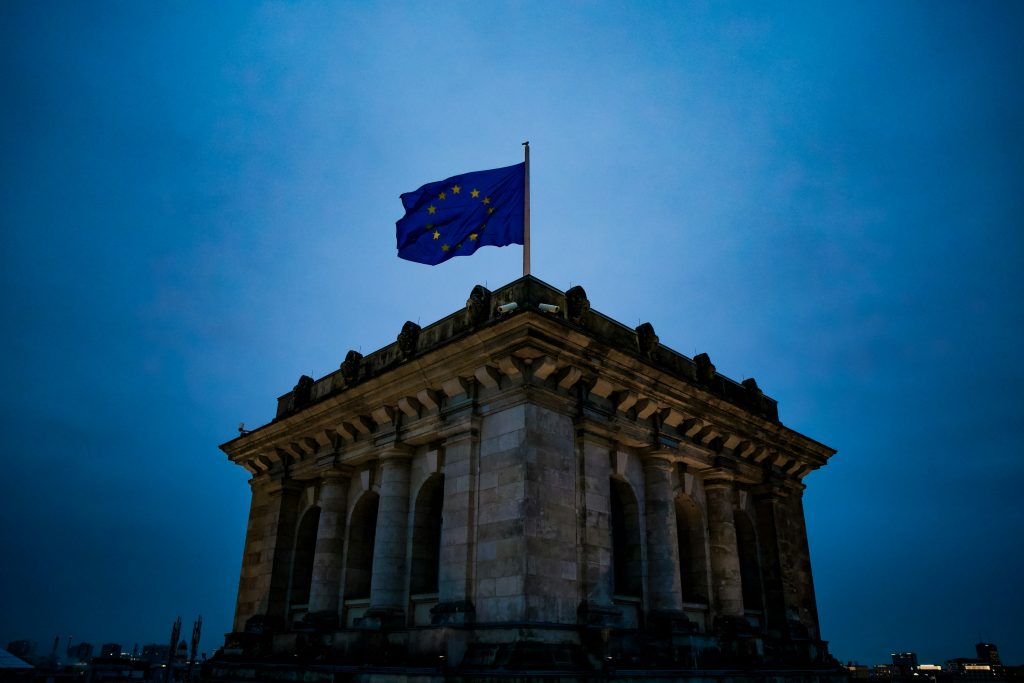A Crossroads for Europe
Europe has reached a turning point in how it defines responsibility in business.
For several years, policymakers, companies, and civil-society groups have been working on a sustainability law — The Corporate Sustainability Due Diligence Directive (CSDDD) is a landmark initiative by the European Commission to make large companies responsible for human rights and environmental protection in their global supply chains.

Now, only months before the law should start to shape corporate behaviour, political resistance has grown. Some governments and industry groups want to delay or even cancel it, arguing that it is too complex and costly. But walking away from this directive would not only weaken Europe’s green and ethical ambitions — it would send a global message that profit still comes before people and planet.
According to experts and international observers such as the Business & Human Rights Resource Centre, the directive ensures that companies are accountable not only for profits but also for their social and environmental footprint.
In my opinion, abandoning the CSDDD would be a historic mistake, both morally and strategically. Europe must resist the temptation of short-term comfort and commit to the long-term vision of sustainable, fair, and competitive business.
Table of Contents
What the Directive Really Means
The Corporate Sustainability Due Diligence Directive is not just another bureaucratic document. It represents an effort to make sustainability mandatory, not optional.
In simple words, the directive would require large companies — and smaller ones in high-risk sectors — to identify, prevent, and fix problems such as:
- Child labour, forced labour, unsafe working conditions
- Deforestation, pollution, or excessive carbon emissions
- Violations of local communities’ rights in global supply chains
Companies would need to show evidence of due diligence — meaning they have taken reasonable steps to avoid harm. They would also need to create clear plans for achieving net-zero emissions and to include sustainability performance in directors’ responsibilities.
This is not an anti-business idea. On the contrary, it aims to create a level playing field where responsible companies are rewarded rather than punished for doing the right thing. It connects moral values with market logic.
Why Some Businesses Are Afraid
Yet, resistance has been loud. Several business lobbies claim that the directive would:
- Increase administrative costs
- Make European firms less competitive compared to non-EU companies
- Scare investors away from Europe’s industries
These fears are understandable but not fully justified. Every transformation brings uncertainty. When the European Union introduced the General Data Protection Regulation (GDPR), many companies complained it would destroy digital innovation. Today, GDPR is a global standard admired and copied by others.
The same could happen with sustainability due diligence. It may require adaptation at first, but in the long run it will reduce risk, improve reputation, and attract responsible investors. Companies that already care about their social and environmental footprint will benefit the most.
The Moral Imperative
We cannot forget why this directive exists. Europe is one of the world’s largest consumers of goods produced across the globe — clothes, electronics, food, and raw materials. Many of these products come from supply chains that hide dark realities: underpaid workers, destroyed forests, toxic waste, and ignored local communities.
For decades, European companies have benefited from cheap production abroad while presenting a clean image at home. The CSDDD tries to correct this imbalance. It asks a simple question: Can a company truly be “sustainable” if its profits rely on exploitation elsewhere?
To me, the answer is clear : no. Real sustainability is global. We cannot export harm and call it growth.
Economic Arguments for Keeping the Directive
Critics often describe the directive as anti-business. In fact, it could become a driver of innovation and competitiveness.
Businesses that integrate sustainability into their strategy will gain trust and long-term value. The insights from our post on ISO Sustainability Standards 2025 show how voluntary frameworks can work hand-in-hand with Europe’s new sustainability law.
- Market demand is changing.
Consumers increasingly choose brands that demonstrate ethical practices. Younger generations are more loyal to companies that align with their values. - Investors want transparency.
The rise of ESG (Environmental, Social, Governance) investing means that capital is flowing toward responsible companies. The CSDDD offers a clear, comparable framework for reporting. - Supply-chain resilience.
Companies that monitor their suppliers are less vulnerable to disruptions, scandals, or sanctions. In a world of political and climate instability, due diligence is risk management. - Global leadership.
If Europe sets high standards, it can influence global trade norms. Instead of a burden, the directive can be Europe’s competitive advantage — the same way GDPR positioned Europe as a privacy leader.

The Political Landscape
The debate around the directive reflects a wider tension inside the EU: between short-term economic pressure and long-term sustainability goals.
Some member states — such as Germany and Italy — worry that their manufacturing sectors will suffer. Others, including France and the Nordic countries, push for strong environmental and social safeguards.
The European Parliament had already reached a compromise version, but several governments hesitated before final approval. This hesitation reveals a lack of political courage. The European Green Deal, the Paris Agreement commitments, and the Sustainable Finance framework all depend on coherent corporate rules. Without them, Europe’s sustainability policy becomes fragmented and weak.
Voices from Business and Civil Society
Not all companies are against the directive. Many global brands, investors, and trade associations publicly support it. They understand that sustainable business is the future, not a trend.
For example, several major fashion and technology firms have already introduced voluntary due-diligence systems. They want the law to ensure that everyone follows similar rules, preventing “free-riders” from cutting corners.
Civil-society organizations, trade unions, and young activists also see this directive as a moral milestone — proof that Europe values fairness as much as competitiveness.
Lessons from Other Regions
Other parts of the world are moving in the same direction.
- Norway already has a Transparency Act requiring human-rights due diligence.
- Germany implemented its own Supply Chain Act in 2023.
- Japan and Canada are considering similar measures.
This shows a global momentum. If the EU hesitates now, it will lose credibility as a sustainability leader. Worse, it will confuse companies who have already invested heavily in compliance.
Why Abandonment Would Hurt Small Businesses Too
One common argument is that small and medium enterprises (SMEs) would suffer. But the directive was never meant to punish them. Most SMEs would not be directly regulated; they would only be indirectly affected as part of larger supply chains.
In practice, the directive would help smaller suppliers improve their practices, gain trust from big partners, and access new markets that demand sustainability proof.
Instead of cancelling the directive, the EU should offer support programs, training, and digital tools to help SMEs comply. Abandoning the law leaves them without direction or incentives.
Environmental Urgency
The environmental aspect of the directive cannot be separated from its human-rights dimension. The planet is approaching critical thresholds: global temperature rise, biodiversity loss, and pollution are accelerating.
Corporate due diligence is one of the few tools that can link business responsibility directly to these challenges. By tracing environmental impacts across supply chains, companies can reduce deforestation, water waste, and greenhouse-gas emissions.
If the EU retreats now, it sends the message that even in the face of climate emergency, convenience wins over courage.
The Role of Consumers and Media
Public awareness will shape the outcome. If citizens and media remain silent, politicians will assume the directive has little support.
Every consumer choice, every article, and every campaign matters. When people ask questions — Where does this product come from? Who made it? What is its footprint? — they reinforce the idea that transparency is valuable.
In that sense, media outlets, bloggers, and influencers have a strong role. They can translate technical laws into human stories, showing how sustainability rules protect workers, communities, and future generations.
Digital Tools and Innovation
Complying with the directive does not mean drowning in paperwork. Modern technology can make due diligence efficient:
- Blockchain can trace products from origin to shelf.
- AI and data analytics can detect risks and verify supplier information.
- Satellite imagery can monitor deforestation and pollution in real time.
Europe has a vibrant tech ecosystem that can turn compliance into innovation. The CSDDD could actually stimulate a new market for sustainability solutions and consultancy services.
Cultural Shift in Leadership
Perhaps the biggest change the directive demands is cultural.
It asks European business leaders to redefine success — not just in terms of quarterly profits, but in long-term impact.
A responsible leader will see due diligence not as a burden but as an extension of ethical management. The younger generation of employees already expect this mindset. Companies that ignore it will struggle to attract talent and loyalty.
The Cost of Inaction
If Europe abandons the directive, what happens next?
- Irresponsible suppliers will keep exploiting weak labour laws abroad.
- Greenwashing will grow, as companies make voluntary promises with no verification.
- Ethical firms will face unfair competition from those ignoring sustainability.
- The EU’s credibility in international negotiations on climate and human rights will weaken.
In short, Europe would lose both moral authority and strategic consistency. It would signal that sustainability is optional, not essential.
Personal Reflection: Why This Matters to Me
As someone who follows sustainable-business developments, I see this directive as more than legislation. It is a statement about who we are and what we want Europe to be.
I believe that economic growth and ethical responsibility can coexist — but only if we accept accountability. The CSDDD embodies this principle. It is far from perfect; implementation will be challenging. Yet, perfection should not become the enemy of progress.
If Europe gives up now, it will spend years rebuilding trust and momentum. If it moves forward, even gradually, it can inspire the world.
When future generations look back, they will not ask whether we balanced every budget line. They will ask whether we acted when we knew better. The Corporate Sustainability Due Diligence Directive is one of those moments when knowing better must lead to doing better.
Choosing the Future
Europe stands before two paths. One leads backward to an economy driven only by price and convenience. The other moves forward to a model built on fairness, transparency, and respect for both people and nature.
The first path may seem easier today, but it will cost us more tomorrow — in lost reputation, legal disputes, and environmental damage. The second path demands courage but promises stability and pride.
Abandoning the Corporate Sustainability Due Diligence Directive would be a historic mistake.
Keeping it, improving it, and implementing it wisely would prove that Europe is serious about its values.
In business, as in life, integrity is the most sustainable strategy.


